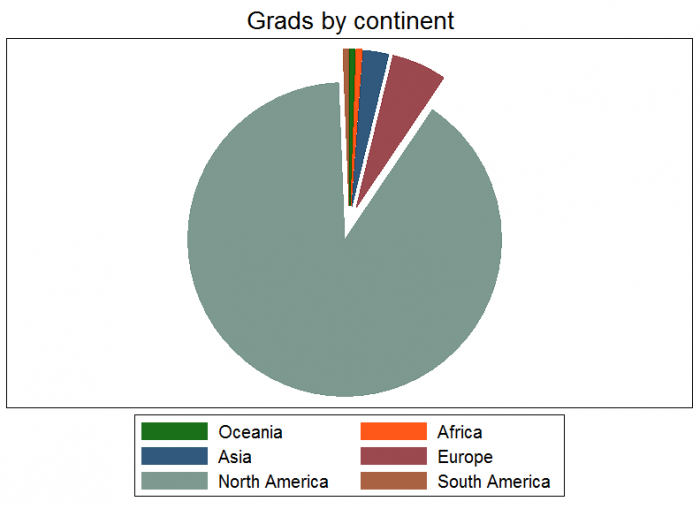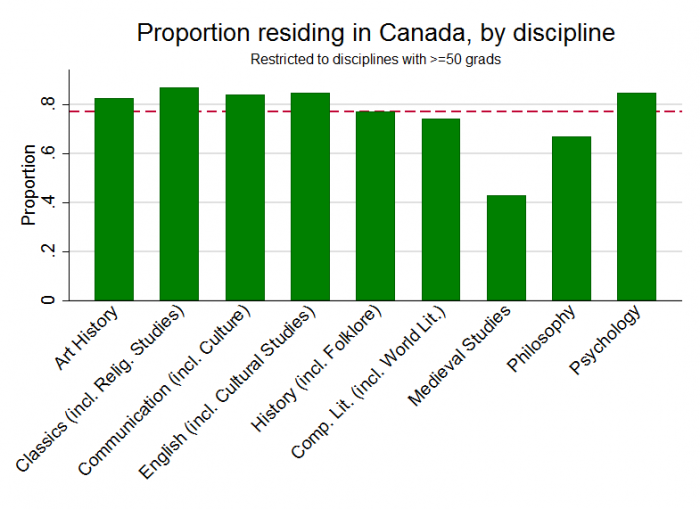One of our recent surveys suggested that geography plays an important role for PhD grads (as it does for many people!). We looked to our data to see where grads end up post-completion, and whether this varies by graduation year and/or discipline.
We have geographical data for about 83% of our current sample, and these grads are dispersed across the world. As we illustrate in the graph below, the vast majority (90%) reside somewhere in North America, but about 6% of our grads reside in Europe, 3% live in Asia, and less than 1% reside in Africa, Oceania, and South America, respectively.

As we might expect, most of our sample (77%) currently resides in Canada, but we wondered if this might vary by discipline. Restricting to the nine departments in our sample with at least 50 observations, we find that the proportion of grads residing in Canada (compared to any other country) is relatively constant across most disciplines. However, as we demonstrate below, the proportion is noticeably lower among Medieval Studies grads (the red line in this chart reflects the overall sample average). We took a closer look and found that grads from this discipline are fairly evenly split between Canada and the US, with a few living in European and Asian nations.

It’s important to note that we don’t know where our grads are originally from or where they hope to end up post-completion, and these are clearly very important factors in any geographical analysis. However, our descriptive analysis begins to shed some light on where in the world humanities PhDs end up after they finish their degrees.
Next time, we’ll report on provincial distributions and the association between year of completion and place of residence. Check back soon!
One of our recent surveys suggested that geography plays an important role for PhD grads (as it does for many people!). We looked to our data to see where grads end up post-completion, and whether this varies by graduation year and/or discipline.
We have geographical data for about 83% of our current sample, and these grads are dispersed across the world. As we illustrate in the graph below, the vast majority (90%) reside somewhere in North America, but about 6% of our grads reside in Europe, 3% live in Asia, and less than 1% reside in Africa, Oceania, and South America, respectively.

As we might expect, most of our sample (77%) currently resides in Canada, but we wondered if this might vary by discipline. Restricting to the nine departments in our sample with at least 50 observations, we find that the proportion of grads residing in Canada (compared to any other country) is relatively constant across most disciplines. However, as we demonstrate below, the proportion is noticeably lower among Medieval Studies grads (the red line in this chart reflects the overall sample average). We took a closer look and found that grads from this discipline are fairly evenly split between Canada and the US, with a few living in European and Asian nations.

It’s important to note that we don’t know where our grads are originally from or where they hope to end up post-completion, and these are clearly very important factors in any geographical analysis. However, our descriptive analysis begins to shed some light on where in the world humanities PhDs end up after they finish their degrees.
Next time, we’ll report on provincial distributions and the association between year of completion and place of residence. Check back soon!
Discussion
Hmm, I wonder why Medieval Studies is significantly lower in Canada. Does MS tend to lead to applying for more academic jobs (of which there are more of in the States)? Curious! Wonder if any MS people have any thoughts on this!
Toronto is by far the largest graduate program for Medieval Studies in Canada, and perhaps in North America. It has traditionally enrolled a very high number of Americans, often around 50%. It is relatively hard to find academic work in MS in Canada, which may send more people to the States (or even to Britain), but I would guess that this is balanced by the tendency of foreign students who end up outside the academy to stay in the GTA.